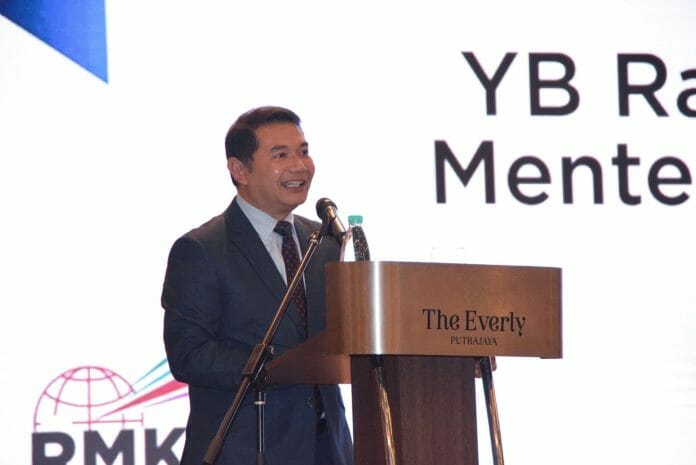Innovation has always been seen as a key factor towards Malaysia becoming a more resilient digital nation. It is against this backdrop that Minister of Economy Rafizi Ramli addressed the need to nurture innovation, during the UK-Malaysia Digital Innovation Programme Demo Day on 20 March 2023.
According to Rafizi, Malaysia is taking a step forward in creating a technology ecosystem which fits with the current administration’s pledge. Rafizi recounted his experience before his appointment as a minister, taking a three-year sabbatical from public life to immerse himself in a tech startup.
He observed how micro-businesses and MSMEs recruit, market, buy and sell. Digital solutions were offered to these entities to do things differently, at half the cost and twice the sales.
Throughout his experience, Rafizi discovered that it was not only difficult to scale up in a country of 30 million people, but Malaysia possessed a limited and subdued culture of innovation.
He does not doubt Malaysia’s readiness to adopt the latest technology, claiming the nation to be one of the most digitally connected countries in the region, since new apps and tools flow through the lives of Malaysians everyday.
“We have no problem being consumers and adopters. But we rarely think of ourselves as creators, inventors, innovators,” he said.
He added that many Malaysians would immediately think of complex, hard-to-obtain digital skills of robotics, cloud computing, genetic engineering, nanotechnology and the like when the word “innovation” was mentioned. This thought makes them feel inadequate to adopt said technologies. Rafizi believes innovation is simply about looking at a day-to-day problem and asking the question, “How can I make this better?”
The UK-Malaysia Digital Innovation Programme Demo Day serves the purpose to shape a society where its people are comfortable with asking that question, and seeing themselves as creators rather than just passive consumers. This is a vital step towards mainstreaming the culture of innovation.
To accelerate that change, outside expertise is required. Note that members of the UK Department of Business and Trade, the Department of Science, Innovation, and Technology, and the British High Commission in Malaysia were also present at the event.
Though there are pockets of innovation and an increasingly open policy environment in Malaysia, innovation as of today remains largely an afterthought. The World Bank found that only 10.5% of Malaysian firms engage in research and development, and an even lower 3.5% have introduced new products in the last three years.
“Our patent applications, a marker for innovation, lag behind our peers, and our rate of commercialising R&D remains stagnant,” Rafizi said, adding that by bringing UK startups to Malaysia, society will be exposed to global best practices, at the same time, creating healthy competition and pressure for local firms to innovate.
Besides nurturing innovation, the UK-Malaysia Innovation Programme seeks to create digital solutions that could bring Malaysia closer to the Net Zero target in 2050. The government recognises that economic growth and environmental sustainability are compatible goals that could be pursued simultaneously.
The environmentally-friendly technology used in monitoring emissions, retargeting resources efficiently, and introducing new “ways of doing” at the value chain will have a multiplier effect on the economy: Lower cost, higher productivity, and more high-value jobs.
“What our government can promise is to keep our doors open to outside help — through investments, expertise, and win-win opportunities — and put in place an ecosystem that is supportive to an innovation-based growth model,” Rafizi said.
He added that the ministry will announce a series of National Hackathons in a few weeks’ time which will be televised nationwide. These serve to enlarge the pool of innovative Malaysians as well as sensitise fellow Malaysians to the routine of problem-solving.
Rafizi also informed that a foundational policy in technology has just begun, an open data platform (API) that is crucial for a country like Malaysia, with a population of only 30 million.
It is here that government ministries and agencies will pool their data resources onto a central platform that could allow anyone to gain real-time insights, from traffic conditions, number of houses in a locality, temperature deviations and rainfalls, and international trade volumes.
These are presented in ways that are easy to use for coders, developers, and any curious Malaysian. Developers and startups could further use the API of the largest central data repository in Malaysia to build products that have the best potential to scale and succeed. Hopefully, the public and private sectors will adopt a data-driven mindset in problem-solving and innovation.
“You can only change culture if you can reach the lowest denominator in society,” said Rafizi, adding that even if large firms can adopt state-of-the-art technology, a culture of innovation will not exist if SMEs, micro-enterprises, and sole entrepreneurs do not actively think about solving problems in a different way.









